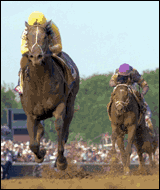The Triple Crown Horseracing

Preview of the 2001 Belmont Stakes and the Triple Crown
by John Gettings |
 Kentucky Derby winner Monarchos (left) is sure to face stiff competition from Preakness winner Point Given. (Source: AP/Wide World Photos) |
Round 2 went to Point Given.
The third and decisive round will be held on Saturday when the two horses meet in the third jewel of the Triple Crown—the 133rd Belmont Stakes.
This is the first time since 1994 that the Kentucky Derby winner will square off against the Preakness Stakes winner in the Belmont.
Should either horse win it would become the 45th horse
to win two of the three races included in the annual Triple Crown.
| Surprise Winners? | |
| Invisible Ink Ink finished less than five lengths behind Monarchos in the Derby and is well rested after sitting out the Preakness. A P Valentine This Preakness runner-up could be the first Belmont winner for trainer Nick Zito. Balto Star This hopeful will be ridden by jockey Chris McCarron who ended Silver Charm's Triple Crown bid at the 1997 Belmont. |
The field will include nine horses, most of which have previous Triple Crown racing experience. Point Given, ridden by Gary Stevens, is the favorite thanks to a decisive victory in the Preakness on May 19.
Origin of the Triple CrownSir Barton became the first horse to win all three Triple Crown races—Kentucky Derby, Preakness Stakes, and Belmont Stakes—in the same year in 1919. But the phrase "triple crown" wasn't associated with the feat until Daily Racing Form columnist Charles Hatton used it while covering Gallant Fox's winning streak in 1930.
| Schedule Kentucky Derby Won by Monarchos Preakness Stakes Won by Point Given Belmont Stakes June 9, 2001 All races televised on NBC at 6:04 p.m. EST |
Seven horses won the Triple Crown in the 1930s and 40s, but only three have won it since. The last, Affirmed, was in 1978.
Since then, seven horses - Spectacular Bid, Pleasant Colony, Alysheba, Sunday Silence, Silver Charm, Real Quiet, and Charismatic - have won the Derby and Preakness, but could not add the Belmont.
The TracksChurchill Downs (Kentucky Derby)—Horse racing in Louisville reportedly dates back to 1783 when impromptu races were held on Market Street in the downtown area. Nearly a century later, 29-year-old Col. M. Lewis Clark began developing America's most famous track on 80 acres of land (leased from his uncles John and Henry Churchill) three miles south of the downtown area. The track formally opened May 17, 1875. The twin spires atop the homestretch grandstands were added in 1895 and remain one of the most recognized structures in all of sports.
| Related Links |
| Belmont Stakes Links History & Results (1867-2001) Triple Crown Links Recent Results: 1997, 1998, 1999, 2000, 2001 Triple Crown Winners Triple Crown Near Misses Kentucky Derby History & Results Preakness Stakes History & Results Thoroughbred Facts Kentucky Derby Quiz Thoroughbred Racing Links Breeders' Cup History & Results Annual Money Leaders Eclipse Award Winners Horse Racing Section National Horse Racing Hall of Fame |
Pimlico Race Course (Preakness Stakes)—America was less than 100 years old when this course in Baltimore held its first race on Oct. 25, 1870. The track was first plowed by an immigrant from the Pimlico section of London. The Maryland Agricultural Society hosted a fair on the site before leasing it to the race's current host the Maryland Jockey Club in 1869. It's the second oldest active track in the country (Saratoga 1864). The original Victorian clubhouse tragically burned down in 1966, leaving only the iron horse-and-jockey weather vane that sat atop its roof. After every Preakness the weather vane, which is now located in the infield, is repainted with the winner's colors.
Belmont Park (Belmont Stakes)—Long Island, New York became the birthplace of horse racing in North America shortly after the region turned from Dutch to English rule in 1665. Constructed from 1903-05 at a cost of $2.5 million, Belmont Park, in Elmont, N.Y. was the area's most expensive track development to date. Named after August Belmont, the late financier father of the tracks founder, Belmont Park opened for racing on May 4, 1905. After nearly 60 years of racing, Belmont closed for renovations in 1963. Five years and $30 million worth of renovations later the "new" Belmont Park opened in time to celebrate the centennial running of the Belmont Stakes.
